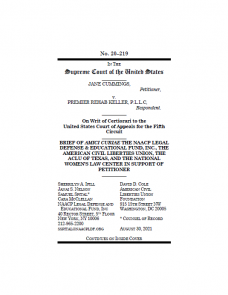Abortion rights, women of color, and LGBTQI+ people are under attack. Pledge to join us in fighting for gender justice.

 UPDATE: On April 28, 2022, the U.S. Supreme Court ruled 6-3 against the plaintiff who was seeking emotional distress damages for discrimination under the Rehabilitation Act and the Affordable Care Act. Applying contract law, the Court held that emotional distress damages are not available under spending clause anti-discrimination statutes—a decision that impacts all four anti-discrimination laws that prohibit recipients of federal financial assistance from discriminating on certain grounds, including Title VI and Title IX, which collectively prohibit discrimination based on age, disability, race, color, national origin, and sex.
UPDATE: On April 28, 2022, the U.S. Supreme Court ruled 6-3 against the plaintiff who was seeking emotional distress damages for discrimination under the Rehabilitation Act and the Affordable Care Act. Applying contract law, the Court held that emotional distress damages are not available under spending clause anti-discrimination statutes—a decision that impacts all four anti-discrimination laws that prohibit recipients of federal financial assistance from discriminating on certain grounds, including Title VI and Title IX, which collectively prohibit discrimination based on age, disability, race, color, national origin, and sex.
***
On August 27, 2021, the National Women’s Law Center, American Civil Liberties Union, and NAACP Legal Defense and Education Fund filed an amicus brief in the U.S. Supreme Court case, Cummings v. Premier Rehab Keller, in support of Jane Cummings. Ms. Cummings is a deaf and legally blind woman who was repeatedly denied an American Sign Language interpreter when seeking treatment for her chronic back pain from Premier Rehab Keller. When she challenged this disability discrimination in court, the federal district court held that she could not recover monetary compensation (“damages”) for the emotional distress she suffered as a result of the discrimination, and the Fifth Circuit appeals court affirmed. While this case concerns specifically disability discrimination, our brief argues that all federal civil rights laws—including those prohibiting discrimination based on race and sex—must allow victims to recover damages for their emotional distress in order to fully compensate them for the harms caused by discrimination. We point out that since the late 1800s, courts have repeatedly allowed victims of race discrimination to recover damages for emotional distress, and indeed Congress passed the Civil Rights Act of 1964, which includes Title VI, to address the emotional harms associated with race discrimination. Additionally, we highlight that emotional distress damages must be available under Title IX as well, given that Congress modeled Title IX after Title VI, and given the wide range of emotional harms suffered by victims of sex discrimination, including student athletes, pregnant and parenting students, and survivors of sexual harassment.

